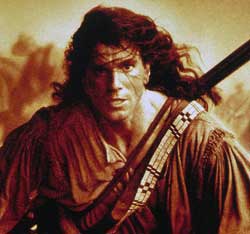 Hawkeye, Deerslayer--the Ultimate Romantic Hero
Hawkeye, Deerslayer--the Ultimate Romantic Hero
Basic Elements of Romanticism
Copyright 1979 by Glenn Turner
Belief that the universe is an organic whole, on the "analogue of man" rather than a random series of chemical and physical reactions, and is sustained by "justice and love"; the universal is moral.
Belief that reality is spiritual as well as physical
Faith that human beings are basically good, not evil
Quest or long search
Sentimentality
"Zeal" for the historical past; especially the Middle Ages, that was seen as "an age of faith, chivalry poetry." In America, the Middle Ages of Europe was replaced by the Frontier Experience and "The Wild West."
Gothicism
Affection and, at times, hatred for nature and the feelings nature arouses
Emphasis up the individual.
Belief in the corrupting influence of civilization
"Interest in the state-of-nature . . . which expressed a preference of the simple life of earlier ages. . . ." such as the life of the noble savage
Rebellion against society and its evils
Struggle for "humanitarian movements and reforms. . . the rights and dignity of mankind . . ." democracy, and political and social freedoms of the individual
Belief in the innocence of the child and in the "clarity of the childhood vision"
Elegiac interest: in death mutability, mourning and melancholy
Use of local dialects and color
"Translation or imitation" of old Celtic, Scandinavian, and Oriental literature
Emphasis of the "imaginative, emotional, intuitive" over the "rational and formal" in literature
Use of analogy to express themes and ideas
Regard for and kindness to animals
Use of heroes who "epitomize many of the most important aspects of Romanticism." The Romantic Hero remains a consistent presence from this time into the 21st century.
